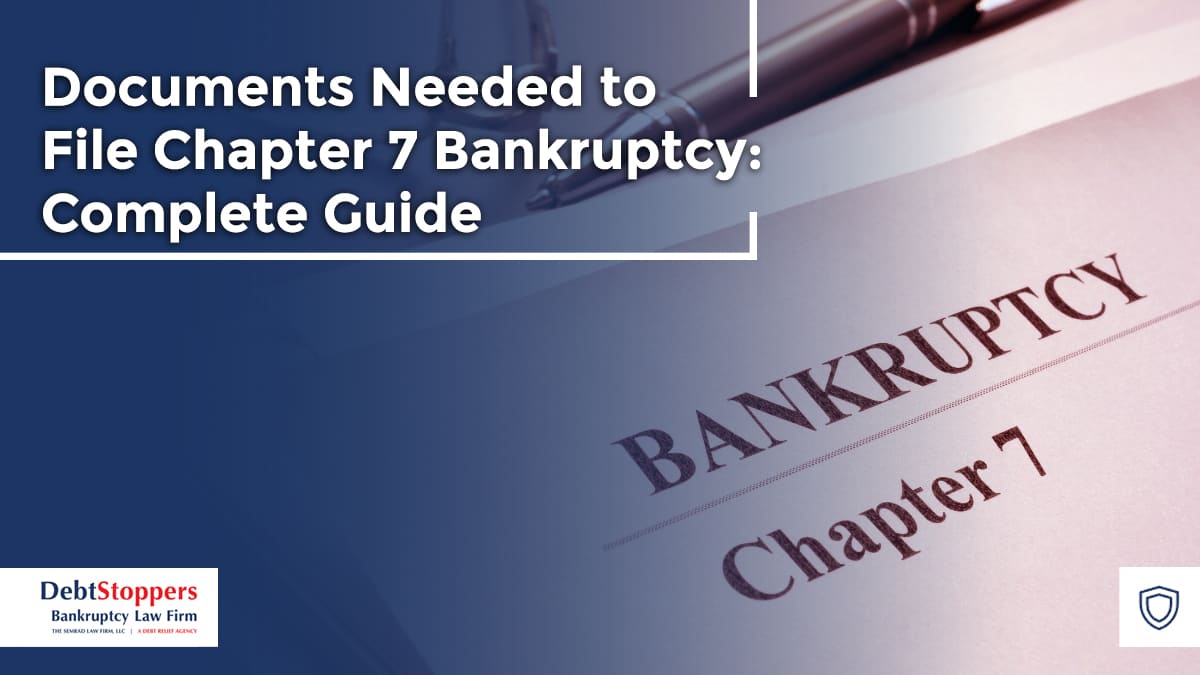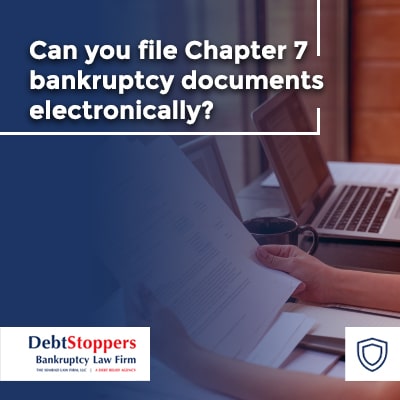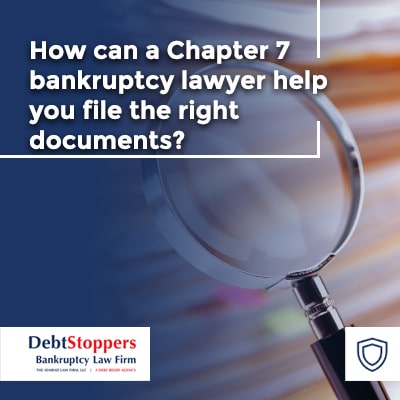Documents Needed to File Chapter 7 Bankruptcy: Complete Guide

When debt starts closing in, most people look for a way to breathe again. For many, Chapter 7 bankruptcy becomes that reset button. It wipes out most unsecured debts and lets you start fresh. But before that can happen, you’ll have to prove to the court what your financial picture really looks like. That means paperwork. A lot of it.
The good news is that once you gather the right forms, the process moves much faster. With the right help and some careful preparation, filing doesn’t have to be stressful. Before you file, you’ll complete a brief credit-counseling course, and a means test (Official Form 122A). It confirms that you qualify for Chapter 7 based on your income and expenses.
If you’re asking, when should you file for chapter 7 bankruptcy, common signs include persistent late payments, growing collection activity, wage garnishment, or failing a repayment attempt that still leaves you short each month.
What Chapter 7 bankruptcy documents do you need to prepare?
If you’ve been wondering what Chapter 7 bankruptcy documents you’ll need, start with the basics. The court wants a full snapshot of your finances. That means:
-
Your recent pay stubs or proof of income
-
Two years of tax returns
-
A complete list of all your creditors
-
Your monthly expenses
-
And any property you own.
Bring recent tax returns (typically the last two years; at minimum your most recent), pay stubs or other proof of income from the last 60 days, your full creditor list, monthly expenses, and any titles or deeds. You’ll also prepare the official petition and schedules (A/B through J), the Statement of Financial Affairs, and a Statement of Intention for secured property.
You’ll also need:
All of this helps the trustee to confirm that you qualify for Chapter 7 and that you’ve been honest about your situation.
If it sounds like a lot, that’s because it is, but once everything’s together, you’re halfway through the hardest part.
How to organize your Chapter 7 bankruptcy documents before filing?
You know how papers just seem to multiply? You start with one folder, and next thing you know, there’s a small mountain on your desk. It happens to everyone. That’s why getting organized early makes such a difference.
Grab a few folders, label them, and don’t overthink it. One for income, one for debts, one for everything else. Put your pay stubs and proof of income in one place, then move on to credit cards and loan statements. Add your bank records and property papers too. Once it’s all in front of you, it’s easier to breathe, and your chapter 7 bankruptcy lawyer will move through it faster.
How to avoid errors when filling Chapter 7 bankruptcy documents?
The truth is that mistakes don’t come from being careless. They come from guessing. Maybe you can’t remember an old balance or forget a small bill that went to collections. Those tiny things slow the whole process down.
Go slow, talk it out if you must, and don’t rush the forms. Check the numbers twice. Read names the way they appear in your statements. Ask if you’re unsure, it’s part of the job for your lawyer to explain it. Your chapter 7 bankruptcy forms and documents required are more than paperwork; they’re your financial story. Tell it right.

Can you file Chapter 7 bankruptcy documents electronically?
Most courts say yes. These days, everything runs online, and filing is no different. It saves time and usually keeps things from getting lost in the mail. But online doesn’t mean effortlessness. Every court has its own little quirks. Some want PDFs in a certain order; others have naming rules for files.
So, before you hit upload, take a breath and double-check. Make sure each page is clear and signed before you file for chapter 7 bankruptcy. If you have a lawyer, they’ll handle this part. If not, don’t rush. Think of it like sending an important job application; you’d never want the wrong file attached.
Attorneys e-file through the court’s CM/ECF system. If you’re filing without a lawyer, some districts offer an Electronic Self-Representation (eSR) portal, while others require in-person or mail filing. Check your local court rules before you upload anything.
And if you’re unsure how to file for chapter 7 bankruptcy, check your local court’s website for step-by-step instructions and deadlines.
What documents needed to file bankruptcy can delay your case if missing?
The thing is that one missing document can slow down the whole case. You might think everything’s ready, then the trustee sends a letter asking for something you forgot. The documents needed to file bankruptcy aren’t just forms on a checklist. They’re the proof behind your financial story.
Bring a photo ID and proof of your Social Security number to the 341 meeting; the trustee will need to verify your identity.
It could be a missing pay stub, a tax return, or a bank statement you thought didn’t matter. The court can’t move forward until everything’s there. It’s not personal; it’s just the way the system works. Therefore, take a little time, open every folder, and make sure nothing slips through the cracks. That last look often saves weeks of waiting.
What happens if your Chapter 7 bankruptcy forms are incomplete or inaccurate?
Here is what happens. You file your case; you think it’s done, and then a letter shows up. Something is wrong. Maybe a number doesn’t match, maybe a page was left out. The court doesn’t guess; it stops the process until you fix it.
That’s stressful, but it’s fixable. You just need to respond quickly and correct it. The chapter 7 bankruptcy required documents must all tell the same story, your real financial picture. Double-check before you file. Read totals, dates, and names out loud if you have to. It sounds simple, but that’s what keeps your case from getting stuck.

How can a Chapter 7 bankruptcy lawyer help you file the right documents?
Filing alone sounds brave until you’re knee-deep in forms you’ve never seen before. That’s when a Chapter 7 bankruptcy attorney becomes calm in the storm. A lawyer already knows how each court likes things done. They notice mistakes before the trustee does. They can tell when something looks off and fix it fast. More than that, they keep you steady when stress hits. Because it will. When you’ve got someone beside you who’s seen this process a hundred times, it all feels a little less overwhelming, and a lot more doable.
If you’re looking for experienced guidance, DebtStoppers has helped thousands of individuals and families successfully file for Chapter 7 bankruptcy, handling every document with care and precision. Having a trusted team on your side means you can focus on your fresh start, not on paperwork.





